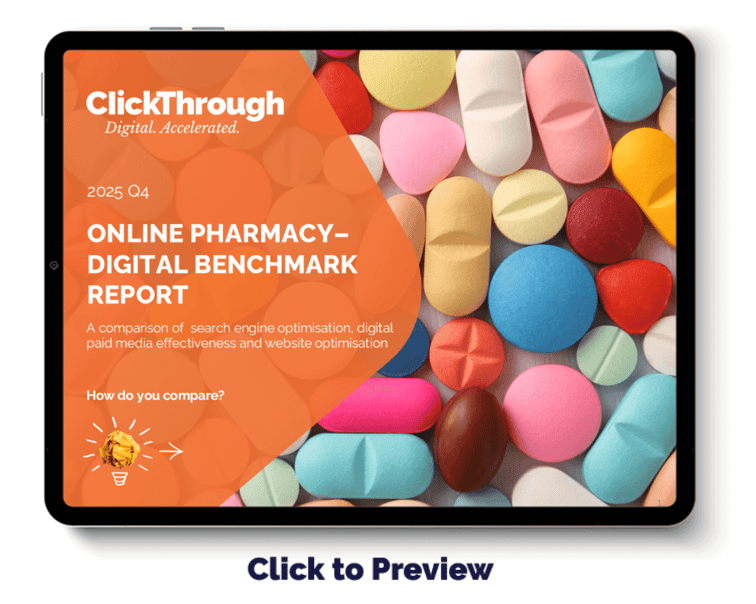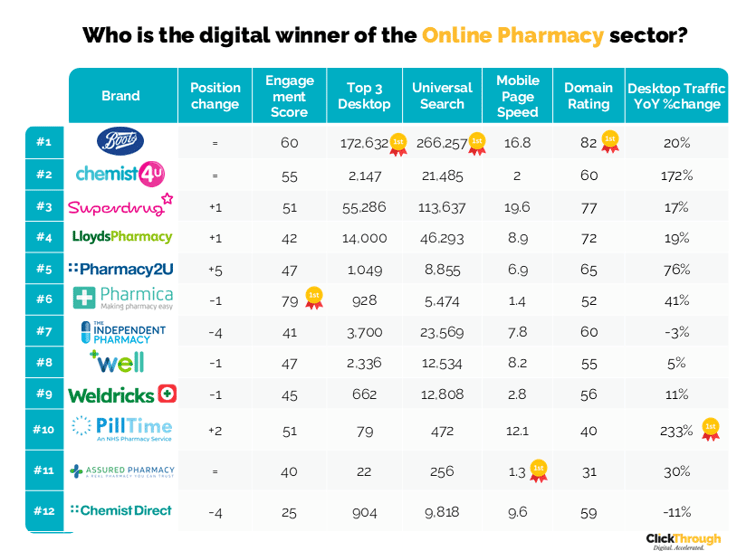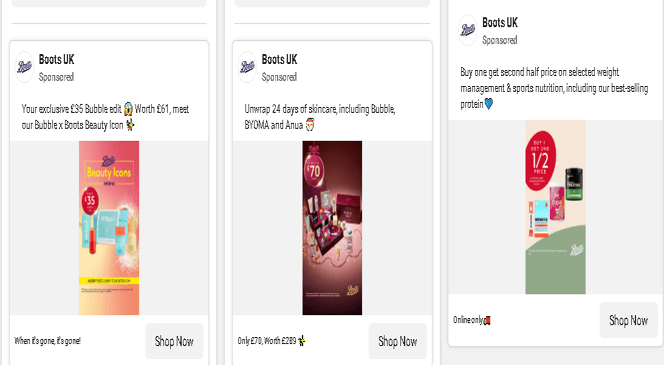The Q4 2025 benchmarking report for UK pharmacies has just been published. Learn how the top 12 UK pharmacies perform across the digital space.
The latest Q4 2025 benchmarking report for UK pharmacies has just been published. It covers the largest 12 national pharmacies, including Boots UK, Well Pharmacy, LloydsPharmacy, Superdrug, PillTime, Pharmacy2U, Weldricks Pharmacy, Chemist Direct, Chemist4U, Pharmica, The Independent Pharmacy, and Assured Pharmacy.

The research gives an inside track on who is winning the biggest share of voice online, and quantifies the gaps, risks and missed opportunities for other pharmacies to win brand exposure, drive online views, and generate orders. The report highlights quick wins that will improve enquiries from your online strategy and identifies the barriers that may be reducing your site’s ability to optimise digital performance.
To see a preview and contents page of the Q4 report, click here. To get a copy of the full report and the key takeaways, please complete the enquiry form or schedule a call. 
Q4 2025 WINNERS LEADERBOARD
For a glance into just 6 of the metrics we evaluated these top 12 pharmacies on, check out our quick-look table below; 
Continue reading for further detail on this quarter's best and poorest-performing UK pharmacies or request a copy of the report for the full review.
What The Industry Research Report Covers
The 70+ pages of research benchmarks each site based on 50+ metrics and indicators of successful digital strategy, including organic visibility, domain authority, paid media ads, conversion performance, technical performance, site speed, universal search, content, social ads, accessibility, and mobile performance.
Driving Optimal ROAS from Paid Media Channels
Some of the leading players in the space are high spenders on paid media channels such as Google, Bing & Facebook - but have a poor or sub-optimal conversion improvement strategy. Without an optimised, sophisticated conversion strategy that maximises the conversion rate, the return on investment is unsustainable or will underperform. Scaling spend on paid media is not achievable unless the conversion rate delivers optimal performance in the sector. Some in the space have paid media spend levels from 30k+ per month but dedicate minimal resources and budgets to conversion testing. Given the cost per clicks on ad networks will continue to rise, we recommend spending at least 10% of your paid media budget on ongoing conversion optimisation testing schedules to ensure your paid media ROI maintains long-term viability, competitive advantage, and sustainability.
Pay-Per-Click Marketing
Pay-Per-Click marketing is constantly evolving, with more and more advertisers being forced to hand over a lot of control to Google's algorithms as the push for automation grows ever stronger. There are still key elements of control that we have though, the main one of these being budget which is ultimately something the algorithms can't take from you. That's why being smart with your budget and ad coverage is essential to achieving strong results and bettering what your competitors have to offer.
For Q4 2025, the average monthly budget wastage across these UK pharmacies was £63,982, with some of the top players in the market spending a considerable amount on areas and audiences unlikely to deliver a return. We can see this in more detail when looking at the average monthly cost per cost-per-click (CPC) amongst advertisers, with the average of this metric being £27 . This highlights how competitive the market is and how important it is to control your budgets effectively.
There are varying monthly ad budgets across the competitors in the report. While this gap highlights the competitive advantage that larger budgets can provide, it's not just about spending more; it’s about spending smarter. By focusing on driving efficiency in campaign management, targeting, and budget allocation, businesses with smaller budgets can still effectively compete with larger players. Investing in data-driven strategies and refining ad performance can help close the gap and maximise the return on every pound spent, enabling growth even in a competitive landscape. Relative to their spend, LloydsPharmacy reported the lowest monthly cost-per-click (CPC) at £6, and Well Pharmacy has the highest at £176.
The report highlights the importance of budget efficiency by comparing monthly ad spend with estimated CPC in relation to your competitors, see who has the highest and lowest CPC. To maximise the effectiveness of your budget, it’s essential to focus on driving CPC down while maintaining or improving campaign performance. In this report, Well Pharmacy has the lowest estimate monthly ad spend at £880, and Boots UK has the highest at £3,990,000.
By optimising targeting, refining ad copy, and leveraging data to identify high-converting opportunities, you can ensure every click delivers maximum value. This approach not only stretches your budget further but also boosts your return on ad spend (ROAS), enabling you to achieve stronger results without simply increasing expenditure.
Technical Website Compliance
Savvy digital marketers know that having a technically sound website is an essential component of a successful fully integrated digital strategy - plus a site capable of maximising conversion performance. Pharmacies should take care of the pathways to key pages, such as best-selling products, FAQs, or seasonal health advice.
In our previous audit, LloydsPharmacy reported the most 404 errors (176). This quarter, LloydsPharmacy has removed all of their 404 errors, reporting a total of zero this quarter. Currently, Boots UK is the UK pharmacy with the most 404 errors, flagging a total of 23. Regularly checking for 404 errors helps protect a site’s SEO performance. Search engines may lower rankings if too many broken links are found. Keeping on top of these errors preserves search visibility and authority.
Site Speed & Conversion Rate Performance
When 62% of consumers are less likely to convert if they have a negative mobile site experience, ensuring that your site is quick and easy to load makes a significant improvement on your overall conversion rates. This is especially important for customers wanting to find their local pharmacy's contact details or to make an order online quickly, from their mobile device.
In our previous report, Boots UK received the slowest mobile site speed (21). This quarter, Boots UK has increased their mobile site speed to 25, no longer making them the UK pharmacy to watch. This quarter, the mobile site speed ranged between 91 and 19, with Chemist Direct reporting the slowest speed. Fast mobile sites build a stronger impression of professionalism and reliability. Visitors associate speed with quality and trustworthiness. This positive experience encourages repeat visits and brand loyalty.
Building Competitive Advantage with Domain Authority
Domain authority is an essential metric for measuring the effectiveness of SEO performance, and helps create a reliable overall gauge of how effective your site is at achieving organic traffic, i.e. ‘free’ traffic that isn’t gained through sponsored ads. Pharmacies can look to collaborate or outreach to publications and bloggers who sit within the health and wellbeing niche to develop their backlink profiles, but can also tie into seasonal events, such as travel health, to expand in other categories.
A ‘good’ DA really comes down to how your competitors are performing, however it is generally considered average between 40 and 50, good between 50 and 60, and excellent above 60. In our last report, Assured Pharmacy received the lowest DA score (29). This quarter, Assured Pharmacy has increased their DA score to 31. Though they’re still the UK pharmacy to watch, any progress demonstrates a site is taking steps to improve their DA. Regularly auditing and updating old content keeps a website relevant, which can help with a brand’s DA score. Search engines reward freshness and accuracy in information, and this continuous improvement signals reliability and boosts authority scores.
Organic Performance – Mobile & Desktop
A strong organic performance is strategically important as it ensures your site ranks above competitors for key, transactional keywords. When 93% of your customers won’t go past the first page of Google, your absence or lack of targeting for essential keywords will cost you conversions. The cost of living crisis is having a wide-reaching impact across many of the sectors we specialise in, with pharmacies being no exception. While pharmacies may have been a natural destination for toiletries and medications, shoppers are now more likely to be buying cheaper alternatives as part of their supermarket shop, or even buying in bulk from online retailers like Amazon.
Two pharmacies reported a drop in organic traffic on desktop, with Chemist Direct flagging the biggest decrease (-11%). On mobile, 4 UK pharmacies saw a reduction in organic traffic, with Well Pharmacy reporting the biggest loss on this device (-49%). Search engine algorithms sometimes prioritise mobile-friendly sites in mobile results. If a website hasn’t adapted to mobile-first indexing, it may rank lower on smartphones. This naturally reduces mobile organic traffic.
Universal Search Opportunity
Google Universal Search Results is an evolving opportunity to make your pages visible on a SERP (Search Engine Results Page). Universal results often appear before traditional listings and are eye-catching for users. Universal search results refer to rankings on a SERP that are not the traditional ‘blue line’ Google link, and a brand can appear for universal search results without being strong in standard rankings. Pharmacies can primarily utilise 'FAQ' and 'people also ask' results to share health information directly from the SERP, along with using 'local pack' results to capitalise on local shoppers looking for nearby pharmacies.
Boots UK remains at the top spot for the most Universal Search appearances (266,257) — a slight decrease from 267,442 in our previous audit. The majority of these appearances came from ‘images’ (228,300).
The Longtail Keyword Opportunity
Longtail keywords are often considered high intent and potentially more likely to convert as a searcher is being more specific. Optimising for longtail keywords also puts your content strategy in a strong position to rank for brand new search terms as they enter Google’s index. Pharmacies can look at brand-specific keywords to improve visibility on longtail keywords, along with terms such as 'next day delivery' to capture traffic from customers needing products quickly.
Superdrug has taken the top spot for the most longtail keyword appearances for position 3 (44,170) and positions 4–10 (84,417), with Boots UK now in second place. Using longtail keywords helps websites align more closely with voice search trends. People tend to use longer, conversational phrases when speaking into devices. Optimising copy for these phrases keeps a brand ahead in search visibility.
Facebook Adverts
With the number of Facebook users in the United Kingdom (UK) hitting over 44 million users in 2023, it is not surprising that companies have jumped at the opportunity to advertise on the social media platform. Facebook’s UK digital advertising revenue has been estimated to have breached 2.6b GB pounds in 2019. Pharmacies can use Facebook ads to generate interest and traffic to seasonal campaigns, such as products for summer holidays or winter colds.
We’ve included screenshots of Boots UK’s sponsored Facebook posts. This UK pharmacy utilised vertical images to optimise their content for social media users — a wise move given that most social media users access their account from a mobile.

Top Social Shares & Content
When it comes to social media and on-site content strategies, it is important to release content that has a longer shelf life. An article is considered 'Evergreen' if it has maintained its relevancy to an audience for longer. It's great for your brand engagement, but great for Google too, who will recognise content which achieves traffic over a long period of time. For pharmacies, social media is an opportunity to share informational content that ties into popular topics, such as must-pack essentials for holidays, advice for boosting your winter immune system, or a guide to common vitamins and supplements.
Boots UK secured the most Facebook Likes (1.4m) and the most Instagram followers (1.2m). Facebook was the most popular social media platforms of all brands. Boots UK received the highest total engagement rate (61,737) and the highest average engagement (65).
Website Readability & Accessibility
20% of people in the UK have a disability – 2 million of which are people living with sight loss. In addition, 1 in 12 men and 1 in 200 women have some degree of colour vision deficiency. When websites are not designed to meet these needs, brands lose customer interest as they turn elsewhere. While accessibility should be a key concern across all sectors, pharmacies (along with any brand within the healthcare sector) must take particular care to present an accessible website, reducing the risk of any ordering errors and ensuring that anyone who needs access to the site can reach it.
In our previous audit, Boots UK received the most accessibility alerts (2,183). This quarter, Boots UK remains the UK pharmacy to watch, and they’ve since increased their accessibility alerts 2,249. Brands that ignore accessibility alerts risk appearing non-compliant with legal or ethical standards. Users expect modern websites to be inclusive and easy to use, and failing to meet those expectations weakens brand trust.
GET THE FULL 70-PAGE Q4 2025 REPORT
To get a copy of the full report, please complete the enquiry form. If you want to talk to us about accelerating your digital performance, please call us on 01543 410014 or schedule a call with Rory Tarplee.





Let's be social
Join our growing social communities to learn more about the benefits of digital marketing and the people who make us tick.